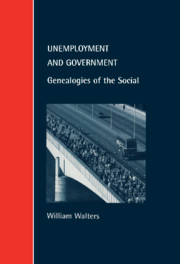Book contents
- Frontmatter
- Contents
- Acknowledgements
- Introduction
- 1 The Discovery of Unemployment
- 2 Inventing Unemployment: The Birth of the Labour Exchange
- 3 Governing Unemployment as a ‘Risk’
- 4 Governing Through the Long-Term Unemployed: Unemployment Between the Wars
- 5 Unemployment and its Spaces
- 6 Governing Divided Societies: The New Deal
- Conclusion
- Notes
- Index
5 - Unemployment and its Spaces
Published online by Cambridge University Press: 07 September 2010
- Frontmatter
- Contents
- Acknowledgements
- Introduction
- 1 The Discovery of Unemployment
- 2 Inventing Unemployment: The Birth of the Labour Exchange
- 3 Governing Unemployment as a ‘Risk’
- 4 Governing Through the Long-Term Unemployed: Unemployment Between the Wars
- 5 Unemployment and its Spaces
- 6 Governing Divided Societies: The New Deal
- Conclusion
- Notes
- Index
Summary
So far this book has confined itself to the formation of modern employment policy and early conceptions of unemployment. In this and the next chapter the theme will be transformations in the government of unemployment over the last fifty years or so. There are several conceptual frameworks one could use to place the development of employment policy this century in a wider political and economic context. For instance, it is not uncommon to find changes in policies for the labour market, and many other aspects of public policy besides, discussed in terms of the rise and fall of the ‘post-war settlement’ – a politically institutionalized consensus, centred on the state, between the class forces of capital and labour. Also commonplace have been discussions highlighting a shift in the ideological underpinnings of such policies: from Keynesianism to monetarism or neo-liberalism, while certain scholars have drawn our attention to more fundamental, organizational transformations at the level of political economy. A whole host of developments within the field of employment policy – ranging from workfare to training, and deregulation to self-employment – are said to be connected with a shift in socio-economic logics, as post-Fordist forms of organization supplant those familiar to Fordism, and as states respond to the challenge of globalization.
This chapter will connect, albeit obliquely, with some of the territory charted by the literature cited above. However, its ambitions are somewhat different.
- Type
- Chapter
- Information
- Unemployment and GovernmentGenealogies of the Social, pp. 98 - 120Publisher: Cambridge University PressPrint publication year: 2000



